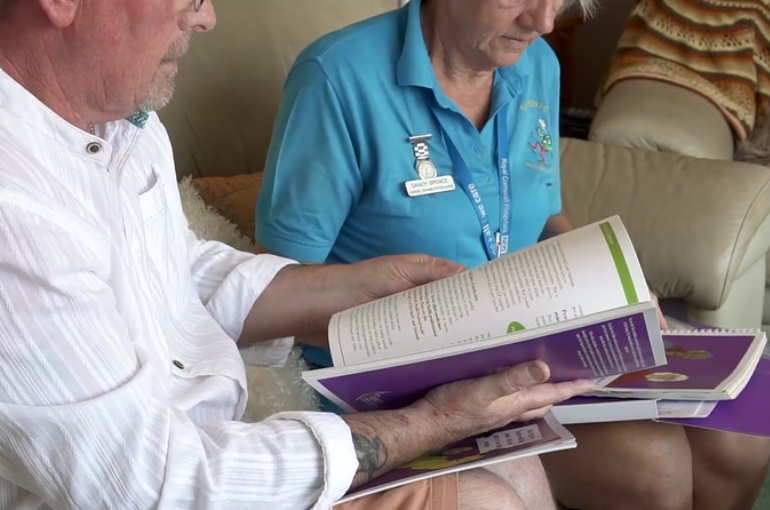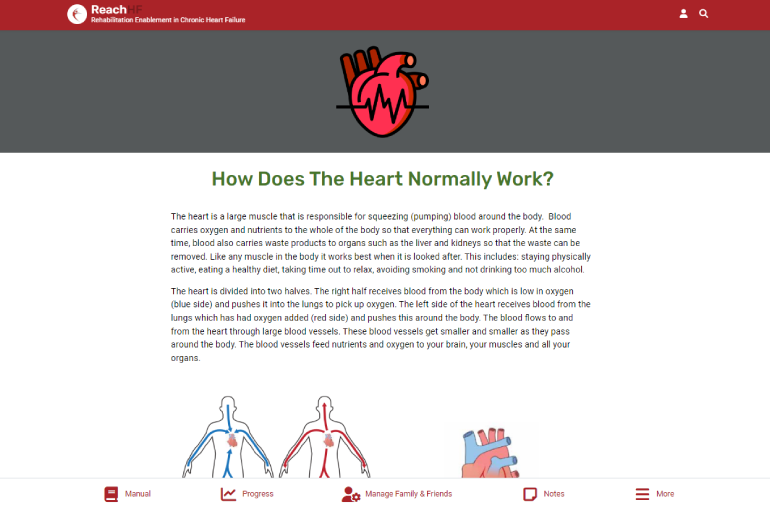Overview of the project
In 2020, the BHF, through its Hope for Hearts fund awarded a grant £166,682 to Dr Hasnain Dalal and team at the University of Exeter to develop innovative approaches to caring for patients with Heart Failure. The award supported the team to develop an online digital version of the evidence based REACH-HF programme to widen access to cardiac rehabilitation to patients with heart failure.
Heart failure (HF) affects approximately one million UK adults and costs the NHS £2 billion per year. Cardiac rehabilitation (exercise and self-care programmes) improves quality of life and reduces hospital stays. However, less than 20% of HF patients participate, often due to access difficulties. Guidelines suggest that more personalised approaches in accessible settings, such as the patient's home to help resolve this.
A flexible model already exists through the Rehabilitation Enablement in Chronic HF (REACH-HF) programme. This programme is a home-based CR programme that captured evidence that it improves quality of life, is acceptable to patients and professionals and is affordable for the NHS.
Although it is well received by patients and carers alike, there were multiple requests to be able to access the programme online to widen access and participation.
The team aimed to address the issue of widening access creating a digital version of the REACH-HF programme to improve patient choice of, and accessibility to, cardiac rehabilitation and to test it with patients, carers and health professionals.
The project worked to create an online version using the four elements of the REACH-HF Programme:
- a patient focused HF manual to increase understanding and support self-care
- a choice of two exercise programmes (chair-based or walking)
- a patient progress tracker
- a resource for family and friends and support from health-professionals
The team commissioned Health and Care Innovations (HCI) a commercial digital company to build and develop the platform throughout the life of the project. Then a user centred approach was used to inform and test the digital platform. This included repeated tests of material development, intervention delivery, data collection, analysis and interpretation, and intervention refinement.
The project comprised 3 stages:
- Planning the intervention
- Iterative development to optimise user experience and engagement with the digital platform
- Formal evaluation, assessing the feasibility and acceptability of the digitally-enhanced intervention
Strong Evidence Base
Although there is an increase in the development of digital tools for cardiac rehabilitation, few of them are based on robust evidence gathered from Randomised Control Trials (RCTs). D REACH-HF is adapted from the REACH-HF programme which was positively evaluated in a multi-centre RCT.
Innovation in widening access
Delivering CR digitally to improve access is attracting interest as offering a digital option allows patients an alternative mode of accessing CR and could improve access even further. This project enables wider access and patient choice as well as creating efficient delivery for both patients and staff.
Funding from the BHF Hope for Hearts Fund enabled the following to be achieved:
Expand REACH-HF into a digital platform
Funding enabled the development and evaluation of the existing evidence-based CR programme for HF into a digital option for patients, carers and healthcare staff. This is now being further evaluated at early adopter sites.
Test news ways of addressing low CR Uptake
Offering patients with HF a digital option for receiving CR in addition to the traditional centre-based modes of delivery should help to address the low uptake of CR in HF. This will help towards meeting the NHS Long Term Plan’s goal of increasing the number of people participating in CR.
To read more about the project and what's next for the initiative, download the end of project report.

Read below the problem the team set out tackle, how the approached it and what the funding enabled them to achieve.



